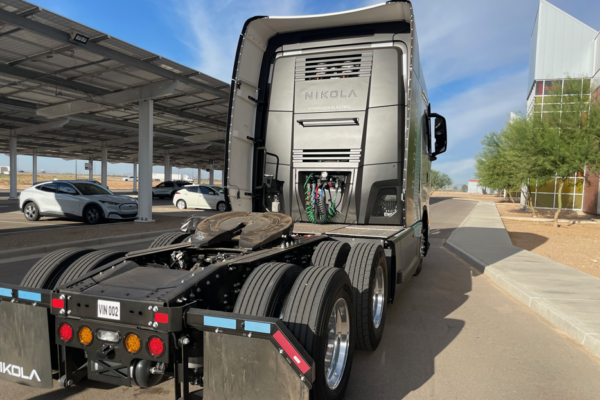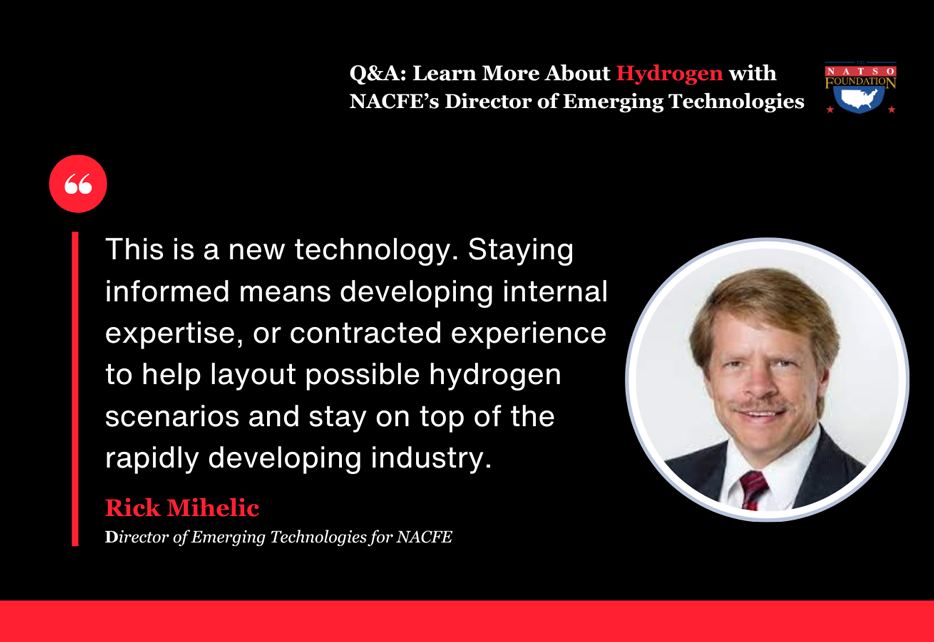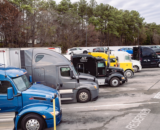Article created for the digital issue of the NATSO Foundation’s
Hydrogen is entering the market as a promising energy source for long-haul trucking, but it remains in the beginning stages.
The North American Council for Freight Efficiency (NACFE) has conducted several in-depth reports on hydrogen and is closely following the role the fuel will play in trucking.
The NATSO Foundation sat down with Rick Mihelic, director of emerging technologies for NACFE, to learn more about hydrogen.
Q: Last year, NACFE released its second in-depth report on hydrogen, Hydrogen Trucks: Long Haul’s Future. What has changed since you released the report?
A. Fundamentally nothing substantive has changed in the report. Previously authorized spending for hydrogen hubs is progressing towards selection and award by the DOE, and additional new funds are also being announced. OEMs are progressing towards product launches. Industry H2 hub groups have mobilized. Interest in hydrogen continues to ramp up.
Q. How are manufacturers progressing on hydrogen technology?
A. PACCAR displayed hydrogen fuel cell trucks during CES 2024. Nikola delivered its first hydrogen trucks in 2023 and has plans to deliver as many as 350 in 2024. Hyzon has done fleet testing with liquid hydrogen fuel cells. Hyundai has debuted its Xcient fuel cell truck in California. Daimler is working on SuperTruck III with a liquid H2 long range concept. Daimler and Volvo formed a consortium to develop fuel cells. Company announcements are the best sources for their latest news.
Q. The California Air Resources Board has certified Toyota’s heavy-duty fuel cell electric powertrain kit as a Zero-Emission Powertrain. What will this mean for the trucking industry?
A. Toyota is a powertrain supplier for Class 8 trucks just as are others like Cummins and Ballard. Having suppliers with established names helps OEMs plan new vehicle options, but the OEMs still control when and how many products launch. A new truck model is much more than the powertrain. It’s a whole system. All of the vehicles must be developed and tested together as a complete system, along with required maintenance, parts and fueling infrastructure and trained personnel. Clearly Toyota has a history of making fuel cell cars and partnering with Kenworth to make prototype trucks tested in California fleets, but they are just one of many possible system suppliers for this hydrogen technology.
Q. In the report, you talk about the need for standardization. What challenges do you see right now with standardization? Are there any challenges with standardization related to fueling in particular?
A. The greatest challenge is that OEMs are working with both gaseous and liquid hydrogen concepts. The two forms of hydrogen fuel have significant ramifications for production, delivery infrastructure, transportation and storage. Until there is progress by OEMs to standardize, the two fuel forms will further split potential design volumes for components for each OEM and for fuelers. After that, OEMs need to partner to increase volumes for components like electrolyzers, fuel tanks, sensors, etc. as the numbers of fuel-cell electric trucks will be relatively small for years to come.
Standardizing fueling installations, as is fairly typical with diesel, is needed. An additional challenge is the use of hydrogen in ICE engines and how will that impact harmonizing part design and production, what fuel forms will it need, etc. Both Westport and Cummins along with startup Hyliion have alternatives to fuel cells that employ hydrogen.
Q. Are there any challenges associated with storing hydrogen at retail facilities?
A. Storing hydrogen is being done for autos in various world regions already. Trucks require much more volume. Supply and demand will not be continuous, neither has it been for diesel. Onsite storage and frequent resupply by tanker trucks, pipelines and even onsite generation will be complex efforts just as diesel has been. Venting may or may not be a challenge. Hydrogen proponents believe there is a long-term energy storage solution for dealing with seasonal supply and demand. Venting can be captured and returned to use.
Q. Truck stop and travel center operators are fuel agnostic and ready to provide any fuel their customers require. Do you have thoughts on what fuel retailers can do now to prepare for a potential shift towards hydrogen?
A. This is a new technology. Staying informed means developing internal expertise, or contracted experience to help layout possible hydrogen scenarios and stay on top of the rapidly developing industry.
First-hand experience with pilot projects is crucial to success. Identifying likely corridors and locations for hydrogen is what many groups are working on now. Joining those groups or at least monitoring their progress is needed. Start with reading NACFE'S reports, attend conferences and talk to those actually doing projects.
Hydrogen is a big topic. NACFE’s last two hydrogen reports are several hundred pages of research and have hundreds of references. This is only scratching the surface.
// This article was created for Stop Watch magazine, the magazine of the NATSO Foundation. The NATSO Foundation is the research, education and public outreach subsidiary of NATSO, Inc. The NATSO Foundation provides programs and products to strengthen travel plazas’ ability to meet the traveling public's needs through improved operational performance and business planning. Visit www.natsofoundation.org for more information. (Donate to the NATSO Foundation here.)
Subscribe to Updates
NATSO provides a breadth of information created to strengthen travel plazas’ ability to meet the needs of the travelling public in an age of disruption. This includes knowledge filled blog posts, articles and publications. If you would like to receive a digest of blog post and articles directly in your inbox, please provide your name, email and the frequency of the updates you want to receive the email digest.





